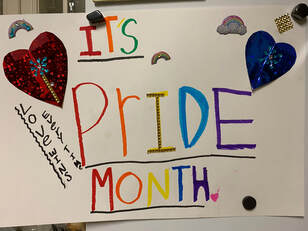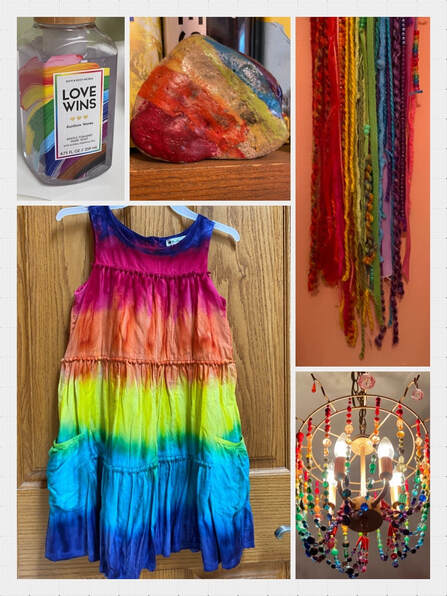 My daughter is a vehement supporter of LGBTQ+ rights. I’m not entirely sure how she got that way. I mean, I’d like to take the credit, but I’m not sure it all belongs to me. She has a true passion for justice, though, and as her mom, that makes me super proud. Perhaps it’s because of her own complicated history in the foster care system. She knows what it’s like to be on the receiving end of bullying. She knows the sting of insult, the pain of rejection, and she recognizes it in others. She doesn’t want anyone to feel those things, so she speaks out against them. But this particular issue has captured her attention in a way that other injustices have not. She makes signs and hangs them up around the house. (See below.) She draws rainbows everywhere, and she strings beads in ROY G. BIV order onto necklaces. We made a rainbow chandelier for her bedroom. She paints rainbows onto rocks, and her wardrobe is absolutely flamboyant with them. She’s loud and proud about her support of her gay aunts and uncles and transgender cousin. Others make crude and careless comments about gays—seventh graders are ripe with newly-formed opinions—but she holds her ground. It’s one of the few things she actually does tell me about her school day: the awful comments she hears and how she responds to them. An unfortunately common example: “That boy told me again that gay people are just wrong and shouldn’t be allowed to live, and I told him that he’s wrong and to go crawl in a hole and die.” (We’re still working on tact, but I love her warrior spirit.) In those moments, I’m simultaneously mortified and proud, which, I’m learning, is not all that uncommon in parenthood. When you see yourself reflected in your child’s behavior, good and bad alike, the experience can be quite humbling. (Although, to my credit, I have not ended an argument with “go crawl in a hole and die” in at least 25 years.) I am a recovering (often relapsing, if I’m totally honest) challenger. I’ve never been afraid to speak my mind, and I often engage in argument simply for the sport of it, much to the irritation of my husband, who thinks far more carefully before he speaks. I argue to dominate rather than persuade, because winning an argument and having the last word just feels good. (Even if it’s an ugly sort of good.) “Winning” doesn’t accomplish anything if the other person feels too railroaded to actually consider your points. My husband’s gentle tactics aren’t ineffective. I've found that days after I "win" arguments, his thoughtful words still ring in my ears. Carefully chosen words can have an incredibly long half-life. My daughter is totally right to be inflamed by those comments. I can’t fault her for that; I’m proud of her for that. She just needs to learn how to respond with respect, even when respect is not given in return. She’ll be a far more effective force with respect in her arsenal. The goal should be to persuade, not to belittle or demean. True persuasion cannot happen when the other party feels disrespected and unheard. As much as that boy’s comments grated on her nerves, I’m sure her aggressive response did the same to him. The true goal of dissent must be effectiveness, not dominance, if it is to cause any sort of lasting change, and that's the lesson I most want to teach my child. So while I’m so proud of my daughter for wanting equality enough to fight for it, I want her to be effective, and matching blows for blows is not the answer. There’s a better way, a higher way, and that way is mutual respect. I need to model it. We all do. Because I truly do believe, like my daughter’s sign says: Love wins. Every time. Happy Pride Month.
0 Comments
|
Old Stuff.
January 2023
Categories.
All
|

 RSS Feed
RSS Feed


